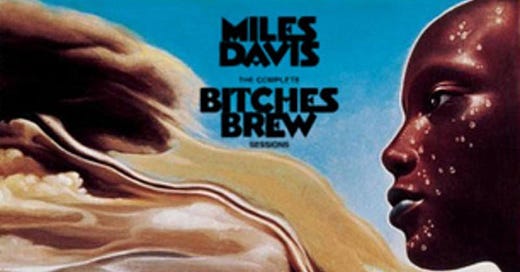'You know how it is, Charlie Parker did that too.’
Miles Davis - 'Sanctuary' (Bitches Brew - 1970)
If you missed it yesterday, I posted a ranking of the first 20 songs we’ve looked at so far on The Run Out Grooves
I'm not a big jazz fan by any stretch of the imagination. If you include Frank Sinatra's In The Wee Small Hours and Songs For Swingin Lovers! as well as Frank Zappa's Hot Rats, I own a dozen jazz records, with over a third of them by Miles Davis. You can no doubt guess which five too if you know anything about the man's back catalogue.
I first heard about the Miles Davis record Bitches Brew in 1999/2000 when it was often mentioned in the context of the build-up to Radiohead1's Kid A, mainly when talking about 'The National Anthem' and some of the sections of OK Computer like 'Subterranean Homesick Alien'. I would wonder, in a world where I couldn't download it or spend a small fortune on a Double CD album on a whim, what a record that sounds like both of those songs could possibly be like.
The answer is, and something that Radiohead have spoken about, the way the atmosphere of the record, all those electric pianos (one for each ear!) are occasionally interrupted by a crescendo of noisy brass instruments. If you are only familiar with Miles Davis' Kind of Blue, and you can imagine that as the sound of someone gracefully descending a swish staircase, all poise, elegance and smart sophistication. Bitches Brew is the sound of them unexpectedly falling down it and knocking over tables at the bottom.
For some people, it's not even the last track they'd give that to 'Feio', also written by Wayne Shorter, Davis' soprano saxophonist and included on the 1999 CD issue as the last track.
The track itself was often performed by Davis' band at the end of the sixties. There is a famous, calmer, more subtle recording from the second great quintet in February 1968, which lacks the expressiveness and chaos of the Bitches Brew version.
The first minute could fit on Kind of Blue; after two minutes, it starts to build, but it isn't that far away from that type of cool, modal jazz - the kind where the drums roll like light thunder in the distance.
Three and a half minutes in, it starts to change, the time signature warps. It seems to break, the electric piano is louder and off from the rhythm and by the fifth minute, the drums are no longer calm and collected. Davis' trumpet is wailing higher and higher, and the whole edifice threatens to come down.
Then we are calm, back to sounding like jazz did before Jimi Hendrix and any ideas about jazz and rock fusion were on the table. Two minutes go by, and it's all playful and easy. Once we hit nine minutes, it starts to get sloppy again, cymbals splash, the register of the trumpet gets higher and longer. And we race into the home stretch, we build towards a crescendo - but it doesn't happen, the closest was in the middle of the track, and the musicians never quite reach the peak we think they might with 30 seconds to go and with 15 seconds to go it winds down and stops.
Despite the hectic sounds of this final track, it does have long periods in which it can breathe; it does serve as a bit of a palate cleanser for you to draw breath after some of the atonal sonic radiation on the album.
I am in my late 30s and grew up in the South East of England so a lot of my musical education in the late 1990s was around understanding what bands I liked were influenced by. I can’t say I’d never have listened to Miles Davis, Aphex Twin, Autechre, Can, Eno etc but the Oxfordshire quintet brought my exposure forward.





Love this one! Thanks for the reminder.